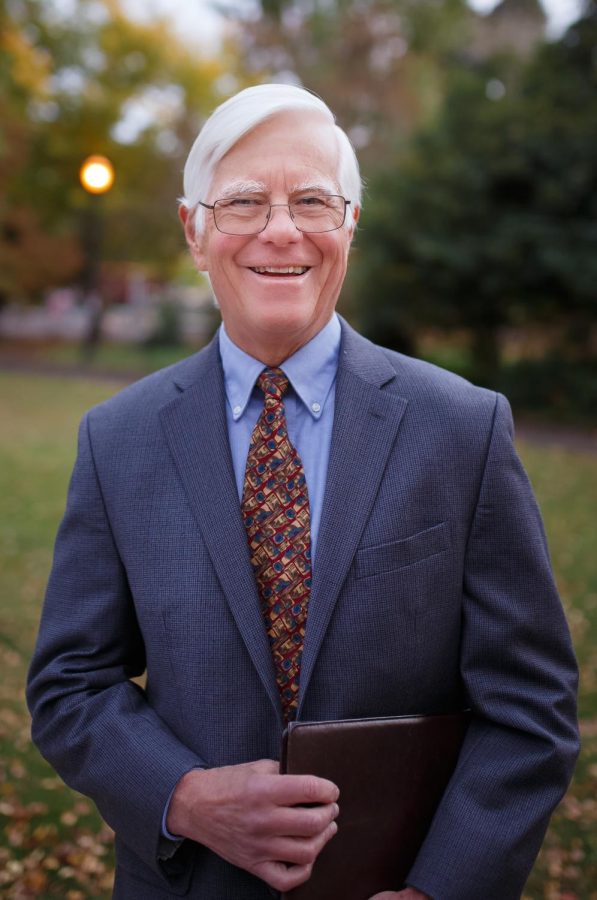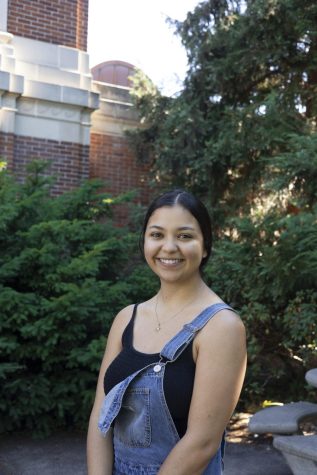Mayor Biff Traber retires after two terms, leaving behind legacy of advocacy
Corvallis Mayor, Biff Traber, poses for a headshot on Oct. 24 at the CARDV Vigil at Central Park. Traber arrived to show support and speak at the vigil event.
November 28, 2022
The Corvallis Climate Action Plan. A local option levy to fund park maintenance and the Corvallis Library. The birth of the OSU Collaboration Project. This is the legacy Mayor Biff Traber leaves behind as he retires from a decade-long career serving Corvallis residents.
Traber, who originally moved to Corvallis in 1998, began working within the community even before he was first appointed to Corvallis City Council in 2011. He moved quickly to serve the community, holding positions with Leadership Corvallis, the Boys and Girls Club, Corvallis Rotary Community Services and United Way, to name a few.
He liked serving on committees for organization in Corvallis, he said, because it allowed him to stay out of the spotlight, but still contribute to his new community.
“If twenty years ago, you’d have asked me if I was going to be an elected official, I would’ve told you no,” Traber said. “I was happy to help — doing things in the community, volunteering at various places.”
Calling himself an “army brat,” Traber moved frequently in his childhood and even into his adulthood before settling in Corvallis. He studied computer science at the University of California Berkeley, where he lived for five years after graduating.
This long history of not settling down in one place ended in 1998 when his wife got a job at Oregon State University’s Linus Pauling Institute.
“It’s probably the best move we ever made,” Traber said.
It wasn’t until Traber was asked in 2011 to replace an outgoing Ward 8 councilor that he even considered being an elected official.
“I said ‘Well, I guess I can try that, I don’t know how well I’ll do at it’ but I was following enough in the city and knew what was going on,” Traber said.
Traber ran unopposed, which is not an uncommon trait for Corvallis elections. He entered the city council while the city had some of the lowest financial reserves and quickly helped put together a local levy, where a percentage of the money received from utilities bills across Corvallis to keep the city from limiting public services.
Traber served two two-year terms as the Ward 8 councilor, before leaving the position to run for mayor in 2014. Julie Manning, the outgoing mayor at the time, encouraged Traber to run for office.
He was originally hesitant, given the publicity that would surround him and the loss of voting power in council meetings if he were to take the position. Whereas city councilors get to vote on every policy change, the mayor only gets voting power when the council is tied.
Traber called his first term as mayor “particularly challenging” given major changes in the city organization: the previous City Manager had just stepped down and four of five city council members were new to the job, causing an ambitious set of goals for the next four years.
“The goals were things like developing the Climate Action Plan which we now have, to develop the 2040 vision that we now have, figure out sustainable financing and analyze and come to (an) approach to solve the housing crisis we had,” Traber said. “Both low-income affordable housing as well as affordable housing across the board.”
The council at the time also moved the city and campus out from a tumultuous relationship to one that is now symbiotic, given the OSU Collaboration Project.
“There were some flawed systems that had been put in place from years before and we needed to work our way through it,” Traber said.
By Traber’s sixth year out in office, Traber successfully organized two local option levies to fund local services, including to the 911 district of Corvallis. By putting service fees on utility bills, a percentage of money was funneled back into these programs.
“One of my priorities throughout the selected time was to figure out how to get the city on more stable financing,” Traber said. Reflecting, he said, “I had done a lot of what I wanted to do, but was worn out by COVID-19.”
Serving nearly his entire second term through the COVID-19 pandemic ultimately led to his decision to retire as mayor. Though, Traber doesn’t plan to completely step away from politics, despite his younger self’s hesitancy to enter the field at all.
“My whole career, I was realizing I guess two years back that I had never been in the same job more than four or five years throughout my career… Now I’m going to find some new things that I haven’t tried before.
Traber sees the opportunity to work for non-profits or help other people become elected officials.
“Who knows what’s next,” he said.


















































































![Newspaper clipping from February 25, 1970 in the Daily Barometer showing an article written by Bob Allen, past Barometer Editor. This article was written to spotlight both the student body’s lack of participation with student government at the time in conjunction with their class representatives response. [It’s important to note ASOSU was not structured identically to today’s standards, likely having a president on behalf of each class work together as one entity as opposed to one president representing all classes.]](https://dailybaro.orangemedianetwork.com/wp-content/uploads/2025/03/Screenshot-2025-03-12-1.00.42-PM-e1741811160853.png)

























